If you’re looking to boost your money management skills, I recommend starting with classics like *”The Total Money Makeover”*, *”I Will Teach You to Be Rich”*, and *”The Psychology of Money”*. These books cover practical habits, mindset shifts, and investment basics, making complex ideas simple and actionable. They’re great for beginners and experienced folks alike. Keep exploring, and you’ll discover even more strategies to improve your financial life and build long-term wealth.
Key Takeaways
- Focus on beginner-friendly titles like *”Personal Finance For Dummies”* and *”The Infographic Guide”* for foundational skills.
- Include books emphasizing practical habits such as budgeting, saving, and debt reduction, like *”I Will Teach You to Be Rich”*.
- Consider works that explore the psychological aspects of money, such as *”The Psychology of Money”*, for mindset development.
- Select resources that blend actionable strategies with motivational stories tailored to different learning preferences.
- Prioritize updated editions and titles covering modern tools, digital banking, and current financial trends to stay relevant.

Mastering Personal Finance: A guide to managing money to unlock financial independence
As an affiliate, we earn on qualifying purchases.
Mastering Personal Finance: A Guide to Managing Money
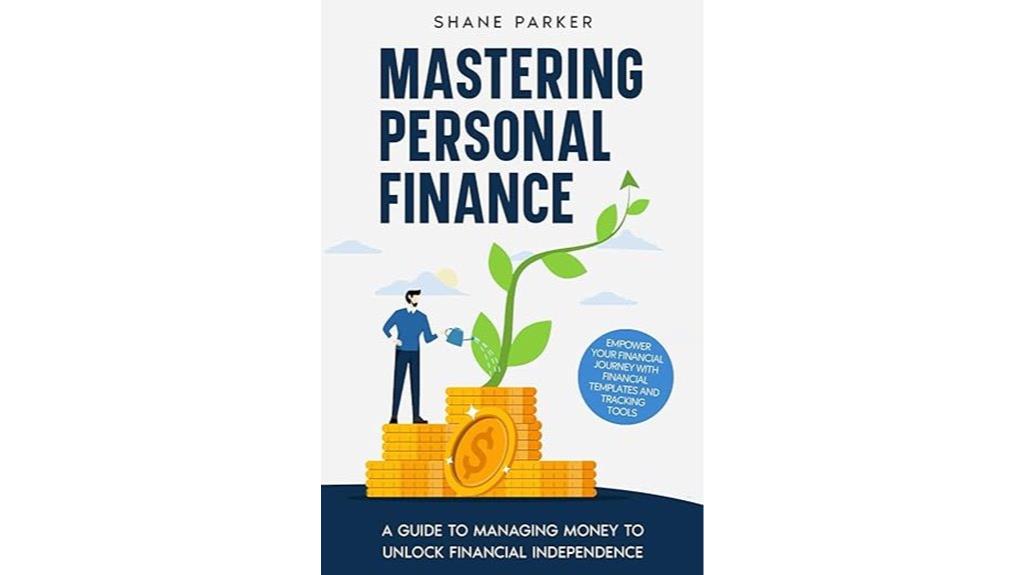
If you’re new to personal finance or feel overwhelmed by financial jargon, “Mastering Personal Finance: A Guide to Managing Money” is an excellent starting point. I found it incredibly helpful because it treats financial literacy as a essential life skill accessible to everyone. The book emphasizes continuous learning through self-study and technology, making complex topics easier to grasp. It offers practical strategies like budgeting, saving, and debt management, focusing on real-life application. I appreciated its straightforward approach, encouraging flexible, realistic goals. Whether you’re just beginning or looking to build confidence, this guide simplifies personal finance, helping you take control and make informed decisions.
Best For: beginners or those feeling overwhelmed by financial jargon who want an accessible, practical introduction to personal finance.
Pros:
- Clear, straightforward guidance that makes complex topics easy to understand
- Emphasizes practical, real-life strategies like budgeting and saving
- Promotes continuous learning and adaptable financial planning
Cons:
- Less focus on specific financial tools or apps
- May lack in-depth coverage of advanced investment techniques
- Some readers might find it too basic if they already have financial experience

Personal Finance Essentials: How to Track Expenses, Avoid Fraud, and Build a Sustainable Financial Future
As an affiliate, we earn on qualifying purchases.
Personal Finance Essentials Book: Tracking Expenses, Avoiding Fraud & Building a Financial Future
The Personal Finance Essentials book stands out as the perfect guide for beginners who want straightforward, practical advice on managing their money. Oliver J. Sage writes like a friend, making topics such as tracking expenses, avoiding scams, and building a financial future accessible and encouraging. The book’s step-by-step guidance helps you develop realistic habits like budgeting, saving, and leveraging assets without feeling overwhelmed or guilty. Its positive tone empowers you to take control of your finances, offering clear strategies to stay disciplined and protect yourself from fraud. This approachable, well-organized resource is ideal for anyone starting their financial journey or seeking to strengthen their habits.
Best For: Beginners seeking clear, practical guidance on managing their personal finances, including budgeting, saving, investing, and fraud prevention.
Pros:
- Provides straightforward, jargon-free advice that is easy to understand for newcomers
- Offers step-by-step strategies to develop realistic financial habits and stay disciplined
- Covers a wide range of topics including debt reduction, asset leveraging, and fraud prevention in one accessible resource
Cons:
- May lack in-depth analysis for advanced investors or those with complex financial situations
- Focuses primarily on foundational concepts, which might not satisfy experienced financial readers
- Some readers might desire more detailed guidance on specific investment or tax strategies

The Psychology of Money: Timeless Lessons on Wealth, Greed, and Happiness
As an affiliate, we earn on qualifying purchases.
The Psychology of Money: Timeless Lessons on Wealth, Greed, and Happiness
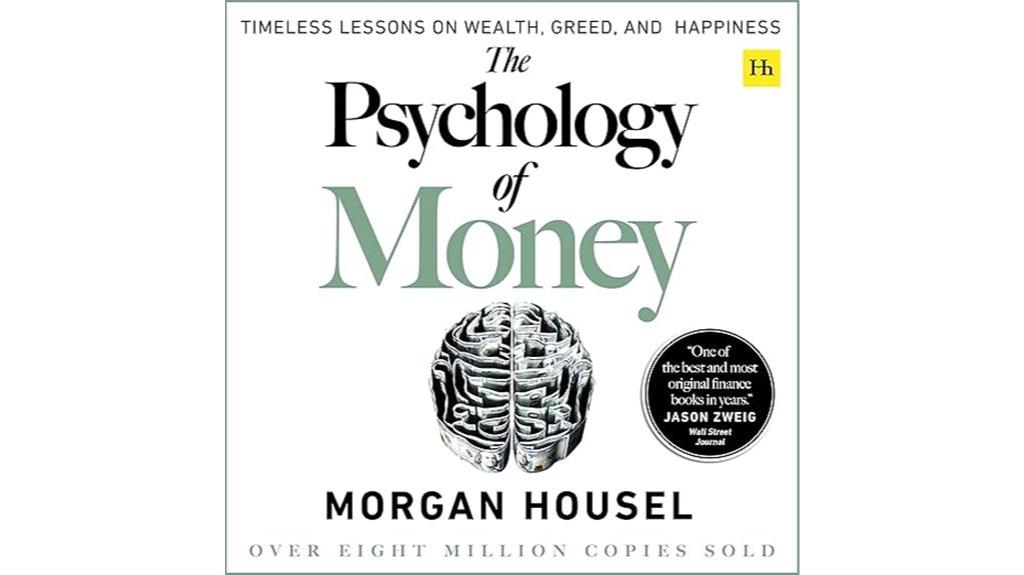
Anyone looking to deepen their understanding of how emotions and biases influence financial success will find “The Psychology of Money” an invaluable read. Morgan Housel emphasizes that wealth isn’t just about numbers but about behavior, patience, and discipline. He warns that greed and impulsiveness can derail progress, while long-term thinking and consistent habits build true wealth. The book explores how biases like optimism, pessimism, and the underestimated power of change shape our decisions. It highlights that happiness comes from controlling time and living below your means, reminding us that money’s real purpose is to serve a fulfilling life, not just to impress others.
Best For: individuals seeking to improve their financial mindset by understanding the psychological factors influencing wealth, happiness, and decision-making.
Pros:
- Emphasizes the importance of behavior, patience, and discipline over technical financial advice.
- Offers timeless lessons on managing emotions like greed and impulsiveness to build long-term wealth.
- Provides relatable stories and practical insights that encourage a healthier perspective on money and happiness.
Cons:
- May oversimplify complex financial concepts for those seeking detailed investment strategies.
- Focuses more on mindset and psychology, potentially neglecting specific technical financial planning tools.
- Might require readers to confront uncomfortable truths about their biases and habits, which can be challenging to implement.

I Will Teach You to Be Rich: No Guilt. No Excuses. Just a 6-Week Program That Works (Second Edition)
It can be a gift option
As an affiliate, we earn on qualifying purchases.
I Will Teach You to Be Rich Book (Second Edition)
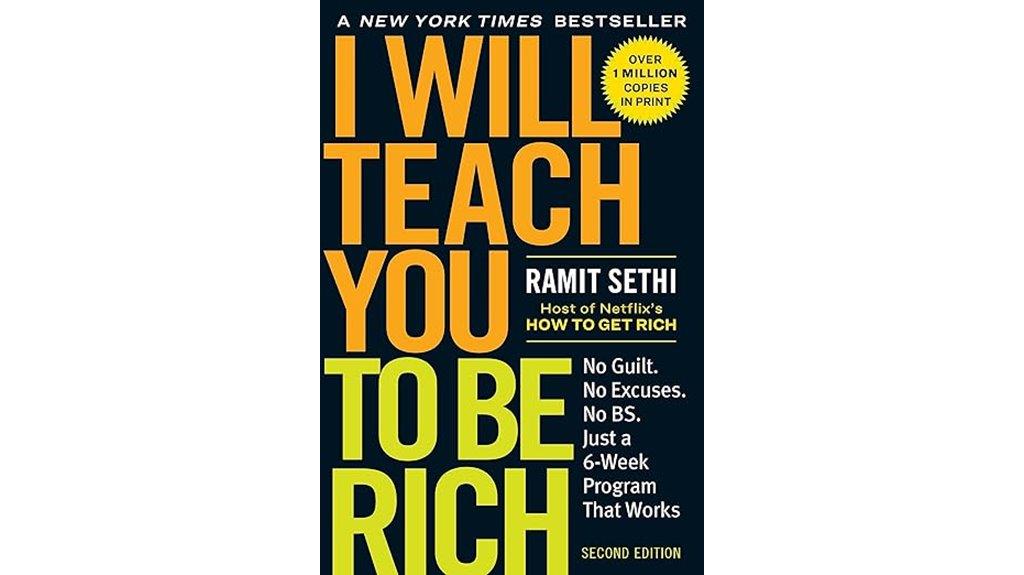
I Will Teach You to Be Rich (Second Edition) stands out for readers who want practical, straightforward strategies to take control of their finances without sacrificing enjoyment. Ramit challenges traditional budgeting, promoting conscious spending—spending on what truly brings happiness and cutting costs on less valued areas. He emphasizes automating finances, like bill payments and investments, to save time and reduce stress. The book offers specific tools, scripts, and transparency about personal accounts, making it easy to implement immediately. It centers on designing a “Rich Life,” balancing wealth with happiness, and focusing on impactful financial choices rather than micro-managing.
Best For: individuals seeking practical, straightforward strategies to manage their finances, prioritize happiness, and automate impactful financial decisions without traditional budgeting constraints.
Pros:
- Provides actionable tools, scripts, and transparency to easily implement financial strategies
- Emphasizes conscious spending and designing a personalized “Rich Life” for greater happiness
- Focuses on automating finances to save time, reduce stress, and make impactful decisions
Cons:
- Omits detailed guidance on real estate investing and large cash purchases like cars
- Less focus on specific stock picks or dividend-paying stable companies
- May not cover niche topics such as managing family debt or complex investment options
Personal Finance For Dummies
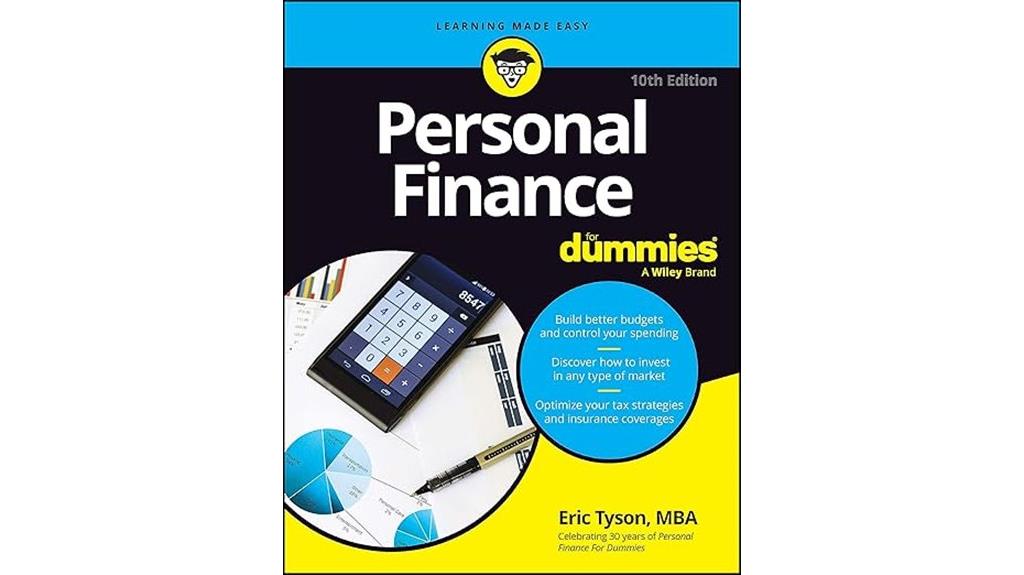
If you’re new to personal finance and want a clear, straightforward guide, “Personal Finance For Dummies” stands out as an ideal starting point. Authored by Eric Tyson, this book simplifies complex financial concepts with plain language and practical examples. It covers essential topics like reducing debt, improving credit scores, and understanding investment options. Updated regularly since its first edition around 2000, it remains relevant despite some outdated scenarios. Many readers have used it to build financial literacy, avoid costly mistakes, and set solid money management habits. Whether you’re a recent graduate or someone seeking a basic financial primer, this book offers a solid foundation to boost your financial confidence.
Best For: beginners seeking a clear, accessible introduction to personal finance who want practical guidance with straightforward explanations.
Pros:
- Easy-to-understand language suitable for high school graduates and new learners
- Covers essential topics like debt reduction, credit improvement, and investing basics
- Regularly updated to remain relevant and useful over time
Cons:
- Some examples and advice may be outdated for today’s complex financial environment
- Lacks in-depth coverage of advanced financial topics for experienced investors
- The format and structure could benefit from a modern refresh to enhance engagement
The Infographic Guide to Personal Finance
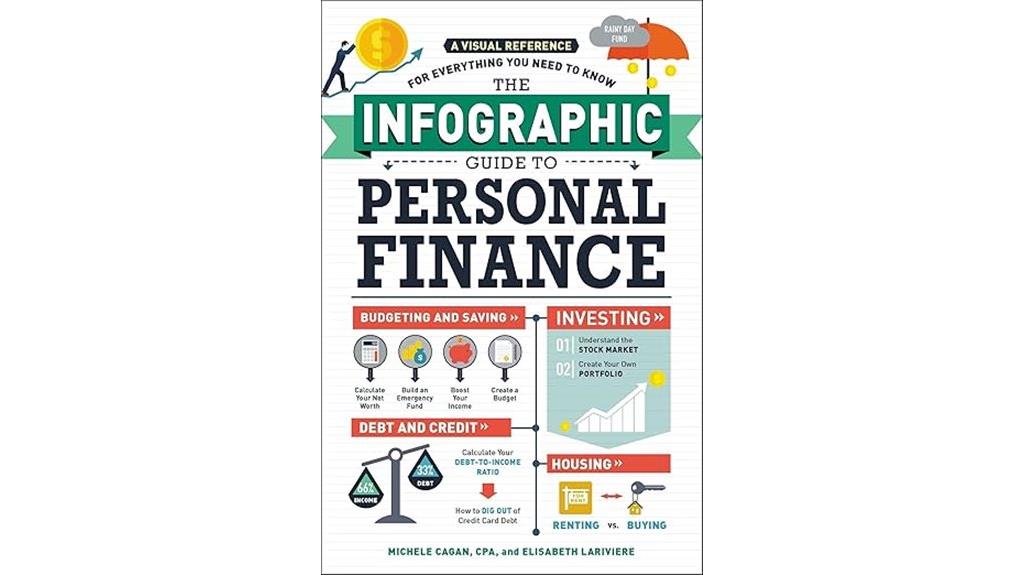
The Infographic Guide to Personal Finance stands out as an ideal resource for beginners who need a straightforward introduction to managing their money. It’s perfect for teens, young adults, or anyone new to financial concepts. I appreciate how it simplifies complex ideas like budgeting, saving, and investing through colorful visuals and clear explanations. While some may find the content a bit basic or region-specific, the step-by-step guidance is invaluable for those starting their financial journey. The engaging infographics make learning easy and accessible, especially for visual learners. Overall, it’s a practical tool to build essential financial skills and confidence.
Best For: beginners, including teenagers and young adults, seeking an easy-to-understand introduction to personal finance.
Pros:
- Simplifies complex financial concepts with colorful visuals and clear explanations
- Serves as a practical, step-by-step guide for building foundational financial skills
- Useful as a teaching resource for families, students, and new learners
Cons:
- Focuses mainly on the USA, limiting its applicability for an international audience
- Some may find the content too basic or not comprehensive enough for advanced learners
- Infographics are more aesthetic than data-driven, which may reduce their educational impact
The Total Money Makeover Book
https://m.media-amazon.com/images/I/81RvIwENAbL._SY522_.jpg
Designed for individuals struggling with debt and seeking a straightforward path to financial stability, The Total Money Makeover offers practical strategies that anyone can implement. I found its simple, proven plan incredibly motivating, especially if you’re drowning in student or credit card debt. The book emphasizes changing your mindset about money, eliminating debt through the snowball method, and building savings. Its no-nonsense approach, combined with real-life success stories, made me feel confident I could take control of my finances. Although some advice is US-centric, the core principles of discipline and diligence are universal. This book truly helped me start my debt-free journey and stay committed to my financial goals.
Best For: individuals overwhelmed by debt who are seeking a clear, practical, and motivating plan to achieve financial stability and freedom.
Pros:
- Simple, straightforward advice that is easy to understand and implement
- Motivating real-life success stories that inspire confidence and persistence
- Focuses on fundamental principles like debt elimination, saving, and disciplined money management
Cons:
- Limited detailed guidance on investing and mutual funds for beginners
- Some strategies, like the envelope system, may be difficult to adapt to digital banking and modern financial habits
- Primarily US-centric, which may require adaptation for audiences outside the United States
The Let Them Theory Book
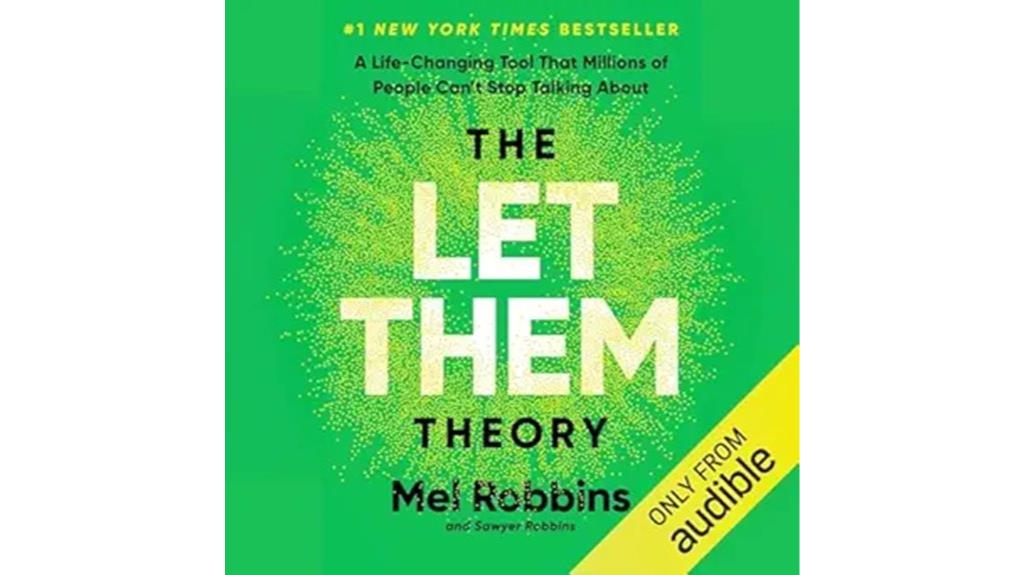
Readers seeking practical, empowering advice on setting boundaries and taking responsibility will find Mel Robbins’ “Let Them” especially impactful. I’ve personally found this book eye-opening, with its real-life examples and straightforward guidance. Robbins emphasizes self-accountability, encouraging us to stop overextending and focus on what truly matters. Her engaging narration makes complex ideas easy to understand, inspiring me to re-evaluate my boundaries and habits. The lessons on unhooking from codependency and embracing personal responsibility have been transformative. Overall, “Let Them” offers actionable strategies I’ve applied to improve my life, and I highly recommend it for anyone ready to take control.
Best For: individuals seeking practical, straightforward guidance on setting boundaries, fostering self-accountability, and improving personal growth and relationships.
Pros:
- Clear, actionable advice with real-life examples that make concepts easy to understand
- Engaging narration by Mel Robbins that enhances the listening experience
- Emphasis on self-responsibility and boundary-setting that can lead to meaningful personal change
Cons:
- Some chapters may feel less applicable, requiring readers to revisit for full benefit
- Physical book quality issues, such as binding falling apart, may require repairs
- Repetitive elements in the book might be unnecessary for some listeners, although they aid comprehension
The Simple Path to Wealth (Revised & Expanded 2025 Edition)
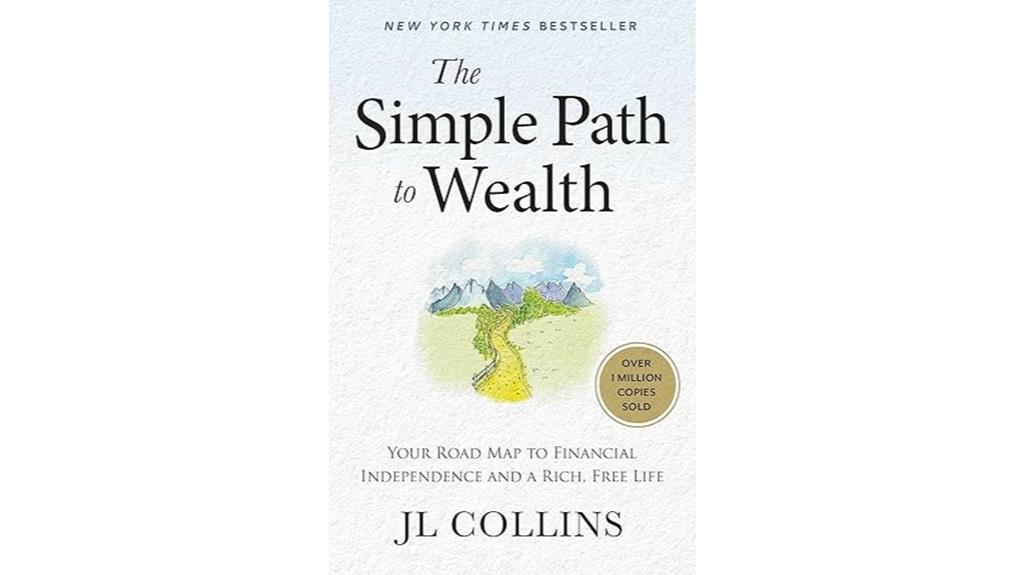
Anyone seeking a straightforward, disciplined approach to building wealth will find “The Simple Path to Wealth (Revised & Expanded 2025 Edition)” an invaluable guide. Collins advocates long-term, passive investing with low-cost index funds, mainly Vanguard, emphasizing simplicity, diversification, and patience. He advises living below means, avoiding active trading, and ignoring media noise. The book highlights the importance of controlling emotions, understanding costs, and using tax-advantaged accounts like Roth IRAs. Collins recommends a simple, diversified portfolio, often excluding international stocks for simplicity, though opinions differ. Overall, it’s an accessible, practical guide that promotes confidence, discipline, and financial independence through steady, low-cost investing.
Best For: Investors seeking a simple, disciplined, long-term approach to building wealth through low-cost passive index fund investing, primarily using Vanguard funds.
Pros:
- Emphasizes low-cost, passive investing strategies that are accessible for beginners and effective for experienced investors.
- Promotes psychological resilience and patience, helping investors stay disciplined during market fluctuations.
- Focuses on simplicity, diversification, and tax-efficient planning, making it easier to manage and understand personal finances.
Cons:
- Often recommends excluding international stocks, which may limit diversification and growth potential for some investors.
- Lacks detailed personal investment examples or specific portfolio allocations, which might leave some readers seeking more practical guidance.
- The suggested high savings rate (e.g., 50%) may be unrealistic for many, potentially discouraging those starting with smaller savings.
Financial Development Book Title
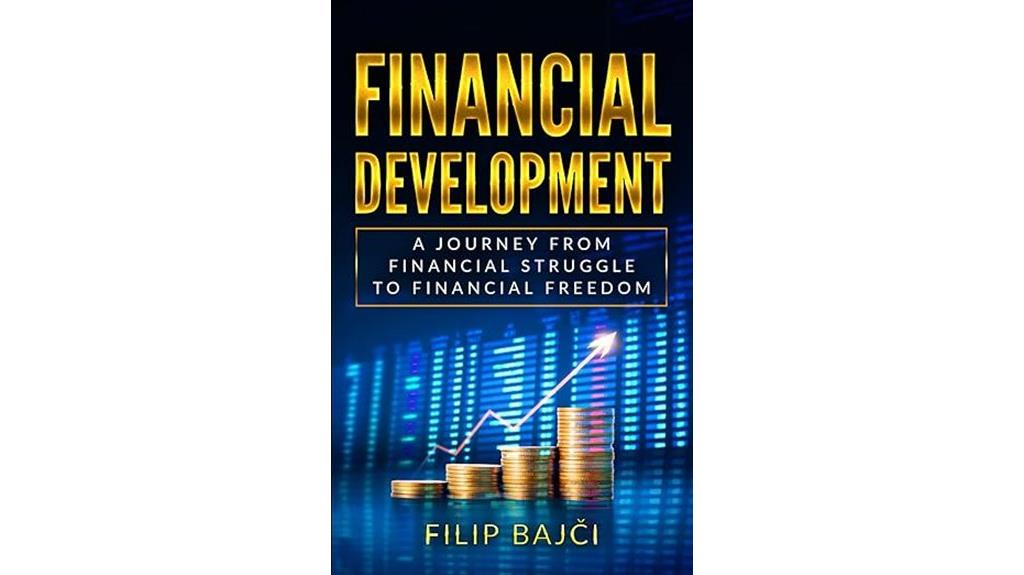
If you’re feeling overwhelmed by debt or living paycheck to paycheck, “Financial Development: A journey from financial struggle to financial freedom” offers a clear, actionable roadmap to regain control of your finances. This book guides you step-by-step, covering debt management, budgeting, saving, investing, and building wealth. It’s perfect if you’re seeking practical strategies and easy-to-understand advice to improve your financial health. Accessible on Kindle Unlimited, it provides straightforward guidance that anyone can follow. Whether you’re just starting out or trying to get back on track, this book equips you with the tools needed to achieve lasting financial freedom.
Best For: individuals overwhelmed by debt, living paycheck to paycheck, or seeking to improve their financial literacy and achieve financial independence.
Pros:
- Provides clear, actionable steps for debt management, budgeting, saving, and investing.
- Accessible on Kindle Unlimited, making it easily available to a broad audience.
- Offers straightforward guidance suitable for readers at various stages of their financial journey.
Cons:
- May lack in-depth technical details for advanced investors or financial professionals.
- Focuses primarily on basic financial skills, possibly oversimplifying complex topics.
- Some readers might prefer more personalized or customizable financial plans.
Unburied: How I Paid Off $221,783.26 in Debt and How You Can Break Free from Financial Chaos
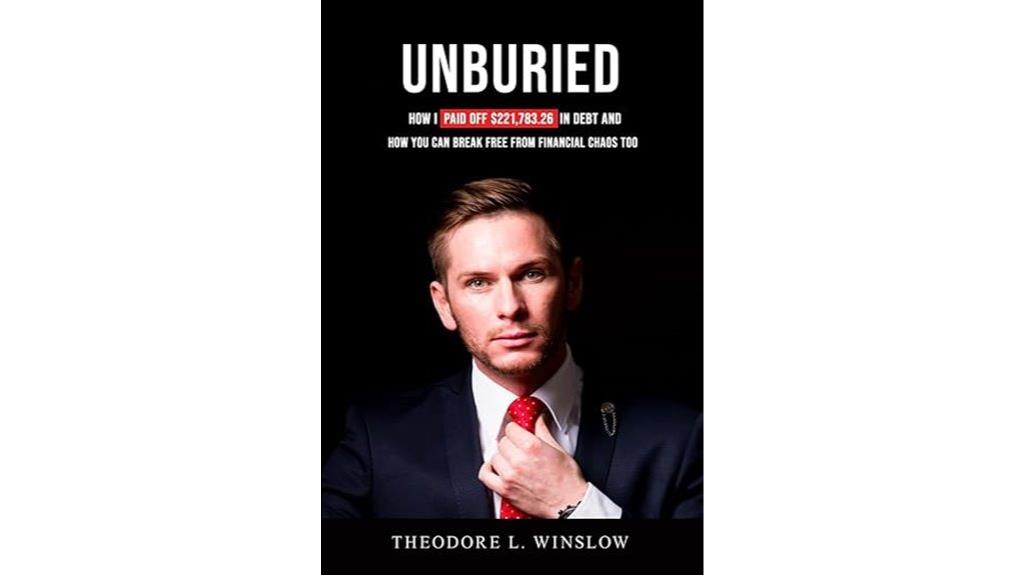
“Unburied” stands out as an essential read for those overwhelmed by debt and seeking a heartfelt, honest approach to financial recovery. I share my raw journey from owing over $221,000 to achieving freedom, blending memoir with practical advice. The book reveals that debt isn’t just about money but also mindset, emphasizing emotional costs like shame and fear. I outline clear strategies such as tackling high-interest debt first, zero-based budgeting, and building resilience. More than numbers, it’s about confronting uncomfortable truths and shifting your mindset. This honest, relatable story shows that with discipline, patience, and inner strength, you can break free from financial chaos.
Best For: individuals overwhelmed by debt who seek an honest, relatable, and practical guide to financial recovery and mindset transformation.
Pros:
- Combines personal memoir with actionable financial strategies for a holistic approach
- Emphasizes emotional healing and mindset shifts alongside practical debt repayment tips
- Clear, relatable, and motivational tone that encourages discipline and perseverance
Cons:
- Some readers may find repetitive sections amid the practical advice
- Lacks detailed step-by-step instructions for complex financial situations
- Not a quick fix; requires ongoing effort and commitment to see lasting results
The Psychology of Money: Timeless lessons on wealth, greed, and happiness

For readers looking to deepen their understanding of how emotions and biases shape financial decisions, *The Psychology of Money* offers timeless insights that go beyond numbers. I’ve learned that our perceptions of wealth are often influenced more by personal experiences, luck, and risk than by facts. Recognizing the importance of humility, patience, and managing ego can transform how we approach money. The book emphasizes that true wealth is what’s unseen—savings and long-term stability—not possessions. By understanding our mindset and social influences, we can make smarter choices, prioritize happiness over status, and build a healthier, more resilient relationship with money.
Best For: individuals seeking to understand the psychological and emotional influences on their financial decisions to build a more mindful and resilient approach to wealth.
Pros:
- Offers timeless insights connecting psychology with financial behavior, promoting healthier money habits
- Emphasizes humility, patience, and long-term thinking, which can lead to sustained wealth and happiness
- Encourages focusing on unseen wealth and personal values rather than material possessions
Cons:
- Concepts may be abstract and require reflection, which could be challenging for some readers seeking practical steps
- Lacks detailed technical investment strategies, focusing more on mindset than specific financial advice
- May be less useful for those looking for immediate financial gains or aggressive trading tactics
The Little Book of Common Sense Investing

The Little Book of Common Sense Investing stands out as an essential read for individual investors who want to simplify their approach and maximize long-term returns. John C. Bogle, the founder of Vanguard, champions low-cost, passive investing through broad-market index funds. He explains that high fees from active management and market timing erode profits over time, making most actively managed funds underperform. Bogle advocates a buy-and-hold, diversified strategy that minimizes costs and reduces risks. His core message is clear: embrace simplicity, focus on long-term growth, and avoid chasing short-term trends. This book is a practical guide to building wealth through common-sense investing principles.
Best For: individual investors seeking a straightforward, cost-effective, long-term investment strategy rooted in passive index fund investing.
Pros:
- Emphasizes low-cost, passive investing which minimizes fees and maximizes returns over time
- Encourages a simple buy-and-hold, diversified approach reducing stress and management complexity
- Backed by extensive research, real-world examples, and respected investment principles, making it highly credible
Cons:
- May oversimplify investment options, potentially overlooking opportunities in active or sector-specific funds
- Focuses primarily on U.S. markets, which might limit applicability for international investors
- Some readers may find the core message repetitive or lengthy, with less emphasis on modern investment innovations
Factors to Consider When Choosing Personal Finance Books

When selecting personal finance books, I focus on the author’s expertise and credibility to guarantee trustworthy advice. I also consider whether the content aligns with my goals and is easy to understand, so I can apply what I learn effectively. Finally, I look for updated information that reflects current trends and practical tips I can put into action.
Author Expertise and Credibility
How can you determine if a personal finance author truly knows their stuff? First, check their professional background—degrees, certifications like CFP or CFA, or extensive experience in finance or financial advising. These credentials show they possess solid expertise and adhere to ethical standards. Look for evidence of practical experience, which means they can offer real-world advice rather than vague theories. A proven track record of published research, awards, or industry recognition adds credibility. Finally, transparency about their own financial journey or biases helps you gauge objectivity and trustworthiness. An author with strong credentials and a history of meaningful contributions signals they genuinely understand personal finance and can guide you effectively. Always evaluate these factors before trusting their advice.
Relevance to Goals
Choosing a personal finance book that truly aligns with your goals makes all the difference in applying what you learn. I look for books that match my current financial priorities, whether that’s paying down debt, investing, or budgeting. It’s important to pick resources that suit my level of financial knowledge—beginner or advanced—to guarantee I get relevant insights. I prefer books that focus on practical strategies and actionable steps tailored to my personal situation. Whether the book emphasizes mindset shifts, tools, or core concepts, I want it to support my long-term goals like building savings or achieving financial independence. Matching the book’s scope with my focus helps me stay motivated and makes the lessons more applicable to real-life decisions.
Accessibility and Language
Selecting a personal finance book that uses clear, straightforward language can make a big difference in how well I understand and apply the concepts. When choosing a book, I look for those that avoid excessive jargon and explain complex ideas simply, making them accessible even if I’m new to finance. Practical examples and relatable scenarios help me grasp principles more easily, so I prefer titles that include real-life situations. Accessibility in my preferred format, whether print, e-book, or audiobook, is also important to keep my learning seamless. I prioritize books designed for a broad audience, ensuring the content isn’t overly technical or specialized. Overall, clear language and accessible presentation boost my confidence and make learning about personal finance more effective.
Practical Application Tips
When looking for a personal finance book, I focus on those that offer clear, actionable steps and practical exercises I can implement right away. I look for resources that emphasize real-life applications, like budgeting templates, debt repayment plans, or investment strategies I can easily adapt. It’s important that the book highlights common pitfalls and provides tips to avoid costly mistakes, such as high fees or poor asset allocation. I also seek out titles that include tools or scripts—for example, negotiation techniques or expense tracking methods—that I can directly apply. Additionally, relatable scenarios and case studies help me understand complex concepts and translate them into everyday decisions. Practical, hands-on advice makes a big difference in turning knowledge into real financial progress.
Updated Content and Trends
Have you ever picked up a personal finance book only to find its advice outdated or irrelevant to today’s economic climate? That’s why it’s vital to choose books that reflect current conditions. Look for titles that incorporate recent trends like digital banking, cryptocurrencies, robo-advisors, and environmental considerations in financial planning. Updated statistics, examples, and case studies aligned with recent regulations, tax laws, and global shifts ensure the advice stays relevant. Prioritize books that address contemporary challenges such as inflation, rising debt, and technological advancements transforming money management. Additionally, opt for titles with recent editions or those that are regularly revised, so you’re learning the latest tools, platforms, and best practices. Staying current helps you make smarter financial decisions in today’s complex economy.
Frequently Asked Questions
How Do I Choose the Best Personal Finance Book for My Goals?
To pick the best personal finance book for my goals, I start by clearly defining what I want to improve—saving, investing, budgeting, or debt management. Then, I look for books tailored to those areas, checking reviews and author expertise. I also consider if the book’s style matches my learning preference, whether practical, inspiring, or straightforward. This helps me find a resource that truly aligns with my financial journey.
Are Personal Finance Books Suitable for All Income Levels?
Absolutely, personal finance books are like a universal map that can guide anyone, no matter your income level. They’re tailored to help you navigate your financial journey, whether you’re just starting out or managing a hefty savings. I’ve found that these books shed light on different strategies suited for varying income brackets, making financial wisdom accessible to all. No matter your starting point, there’s a book out there to empower your money skills.
How Often Should I Revisit Personal Finance Books?
I recommend revisiting personal finance books at least once a year. As your financial situation and goals evolve, so should your knowledge. I find that reviewing these books periodically keeps me motivated and aware of new strategies. Sometimes, I revisit specific chapters when I face particular challenges or want to refine my money management skills. Regularly rejuvenating your understanding ensures you’re always making informed financial decisions.
Can Reading These Books Replace Working With a Financial Advisor?
Reading these books can definitely boost your financial know-how, but they can’t fully replace working with a wise, willing financial advisor. I believe in blending bookish knowledge with personalized advice, because every financial situation is unique. Books provide broad-based benefits, while advisors offer tailored insights. So, I recommend leveraging both—learning from literature and listening to an expert—to maximize your money mastery and make smarter, safer financial decisions.
Which Books Offer Practical Steps Versus Theoretical Advice?
If you’re looking for books with practical steps, I recommend “The Total Money Makeover” by Dave Ramsey and “Your Money or Your Life” by Vicki Robin. These books provide clear, actionable advice to improve your finances. I’ve found they focus on specific strategies you can implement right away, unlike more theoretical books that explore concepts without concrete steps. They’re great for turning financial ideas into real, manageable actions.
Conclusion
Ultimately, the right personal finance book can be a game-changer on your money journey. I’ve found that knowledge truly empowers us to make smarter choices. Remember, Rome wasn’t built in a day—be patient and consistent. Immerse yourself in these books with an open mind, and you’ll soon see your financial confidence grow. As they say, “The journey of a thousand miles begins with a single step.” Start yours today!









